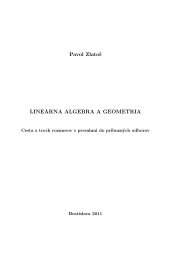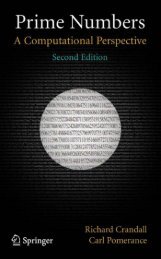186 E. Krause and K. Weston mk}, mi = W$(Xl, . . ., x,), we show here an easy method to calculate A, from the matrices M6(g(xl)), . . . , M,(g(x,J). IfIi, . . . . & is the natural basis for A, then by (1) Ai @ Aj = M&(mj)) X Ai (i.e. 1i@ & = the ith column of M&(mj))). Thus a multiplication table for A, is easily calculated by observing the columns of the matrices ~,tdml)), . . -, M&(mk)). Because of our convention of writing operators on the left, the inner derivation g is a Lie anti-homomorphism of L into the algebra of linear operators : de-m) = [g(m), g(e)1 = - Me>, g(m>l, e, m EL, where V’, Sl = TS’-- ST, S, T linear operators. Also MP(g(e.m)) = [MB(g(m)), h$(g(e))] or more generally %&tel, . , . , ej)> = t- l)j+1W&ted)9 ~&te2)), . . -, ~&dej))l. (2) Consequently (2) affords a simple formula for calculating M&(mi)), i= 1,. . . , k from the matrices MB(g(xr)), . . . , J@g(x,)). Therefore, with restrictions on the size of k of course, one can use a computer to calculate and even print the multiplication table of A, given the matrices ~&d~l)), . . ., ~&tx,)). Algorithm for L(p, n, m) (m -= p). Designate L(p, n, m) by L; since m-=p, L(p, n, m) is nilpotent of class c [2]. We wish to use Theorems 1 and 2 to determine a basis p for L/Lk (k = 1,2, . . . , c) from the bases of L/L=, . . . , Lkm2JLk-l. Therefore A, 2 L[Lk by Theorem 1. Suppose L is generated by x1, . . . , x, and LIx/La+l (a = 1, . . . , x- 1) has a basis consisting of monomials p@ = {m,, l+La+l, . . . , m,,jl+La+l} m,, ji = m, jc (Xi, . . . , x,J. Next select any set of monomials Pk-i = {mk-1, l+Lk, . . ., mk-l,jkel+Lk}, mk-l,jr = mk-1, ji(Xi, . . . , Xn) which span L k - ’ IL k . For example &-l could COnSist of all of the monomials with k- 1 factors. Then L/r;” is spanned by B = {ml,l+Lk, . . . , ml, j,-tLk, . . . . , mk-l,lfLk, . . ., mk-l,jkel+Lk} and p constitutes a basis if and only if fl&., is a basis. Thus if A, is a Lie algebra over GF(p) on n generators satisfying the mth Engel condition, then A, % L/Lk by Theorem 2. Hence, by Theorem 1, fl is a basis, which in turn implies that p&1 is a basis. If A, fails to satisfy any of the above conditions, ,$+i must be a set of dependent vectors. Thus we have to select a proper subset spanning Lk-‘/Lk and repeat the process. This process of course only affords us a check whether a basis has been found for Lk-l/Lk and does not actually calculate one except by trial and error. The use of a computer to calculate A, has already been mentioned. A computer may be used also to scan the multiplication table of A, and determine which of the conditions of Theorem 2 are fulfilled by A,. A pro- _ Restricted Burnside group of prime exponent 187 gram for determining whether A, is a Lie algebra on n generators satisfying the mth Engel condition is on file in the Computing Science Library of the University of Notre Dame. REFERENCES 1. E. KRAUSE and K. W ESTON: The restricted Burnside group of exponent 5 (in preparation). 2. A. KOSTRIK<strong>IN</strong>: On locally nilpotent Lie rings satisfying an Engel condition. Doklady Akademii Nauk SSSR (1958), 1074-7.
A module-theoretic computation related to the Burnside problem A. L. TRITTER ALTHOUGH the Burnside conjecture is known to be true for exponent 4 (i.e. although it is known that finitely generated groups of exponent 4 are finite), we cannot usefully say that the Burnside problem is settled, even in this case. For instance, a sharp bound on the order of B(4, n) would be valuable, and there are perhaps other questions that arise in consideration of the Burnside problem whose answers would be of interest. 1. Introductory considerations. Defining the lower central series {Gi} and the derived series {Go} of a group G in the usual way : GI = G, G+I = [G, Gl, GC’) = G, G(i+U = [GOI, (JO], where [H, K] (H& G, KE G, G a group) is the least subgroup of G containing all commutators h-li?-%k (& H, kE K), we know that, for every group G and for every natural number n, G(“)E Gsn, But we can deduce from a result of C. R. B. Wright [1] that, when G is of exponent 4, any inclusion G(‘)S G, not predicted from this elementary result (i.e. with 2’(s) must lead to a bound for the derived length of G. If we choose G = B(49 8) and II = 3, what we are saying is this: (i) we know Gc3) 5 Gs to be true * (ii) if we could show Gc3)ZGs we could bound the derived length of every group of exponent 4. The bound would be applicable to all groups of exponent 4 because of the natural homomorphisms to groups of exponent 4 on fewer than 8 generators and the fact that, for any group G, GC31 is generated modulo Gs by commutators of the form [[[a03 al,], [&t, a311, [[a43 a519 [a62 a7111, where the a, are among the generators of G, so that no more than 8 distinct generators of G could be present in any one of these commutators. We wish, therefore, to show that: 189




